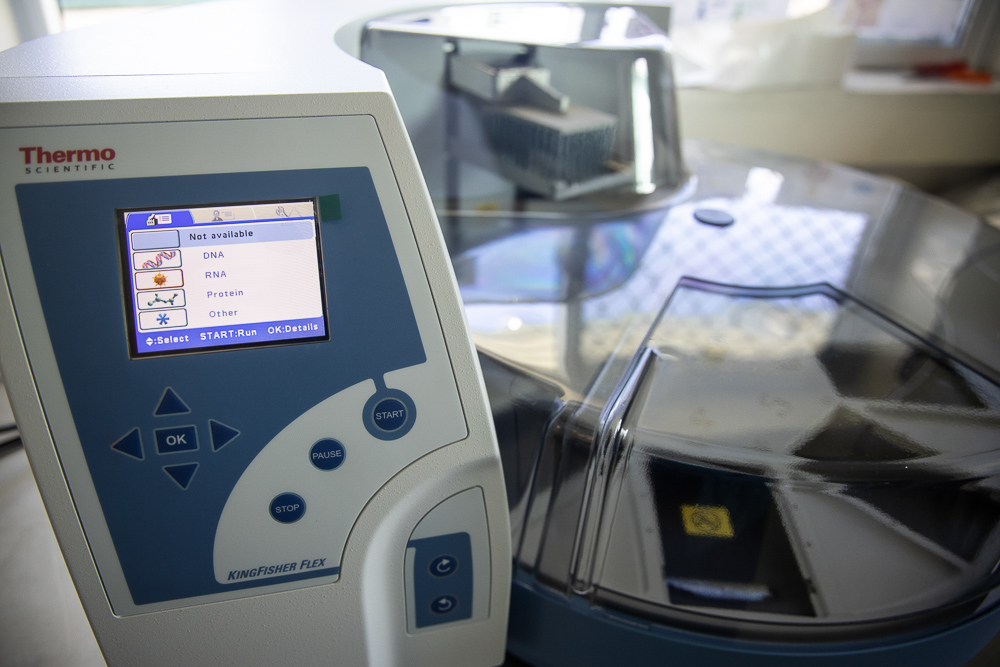Donation enables S.R.O.S. to test for coronavirus
 By Adel Fruean
•
23 July 2020, 1:00PM
By Adel Fruean
•
23 July 2020, 1:00PM
The Scientific Research Organisation of Samoa (S.R.O.S.) will soon have the ability to conduct COVID-19 tests for up to 300 samples per day, should the Ministry of Health need it.
This has been made possible with the donation of 2,000 test kits and a Real Time-quantitative Polymerase Chain Reaction (RT-qPCR) equipment to the organisation. The equipment, valued at US$293,000.00 (T$795,451.00) and has the ability to test for COVID-19 and other invasive pathogens.
The Chief Executive Officer of S.R.O.S., Dr. Seuseu Tauati acknowledged the support from the United Nations Development Programme (U.N.D.P.) which presented the much needed equipment last month.
“S.R.O.S. has always wanted the molecular equipment which initially started by our Minister of Agriculture who wanted to test for African Swine Fever (A.S.F.),” he told the Samoa Observer.
Dr. Seuseu added that in the coming months S.R.O.S. will be able to provide the service.
“We can test for the presence or the absence of a virus of concern including COVID-19, A.S.F," he said.
“If it’s a new virus that we have not yet got the solutions that deal with the molecular equipment to work with then we will obtain the solution before we offer the service. As a service provider, we will provide the service for the Ministry of Health (M.O.H.) if they want or any clients will bring them to us and we can test it for the presence or absence of the virus.”
The Associate Professor and Manager of the Plant and Postharvest Technologies Division under S.R.O.S., Masuisui Dr. Seeseei Molimau-Samasoni, also highlighted that while the equipment is fully functional, they are waiting for two types of solutions from Australia before they can do COVID testing.
“At the moment, we are waiting for two solutions which are binding and wash –those have corrosive and flammable components in it so they can’t be transported on passenger flights.
“For COVID testing alone there is a specific set of procedures to be done so just because we are trained to use the equipment for research purposes does not mean it’s the same for COVID testing –it has its own specific kit that we need to follow the procedures.
“Our staff will undergo training on COVID testing and each staff will wear personal protective equipment – we also have decontamination procedures as well.”
She added that the process of the COVID testing starts from receiving samples - which health will do all the swabbing and once we will receive the swabs we prepare it in the Biosecurity Cabinet.
“Then move on to do R.N.A. [Ribonucleic acid] extractions in the KingFisher Flex and once the R.N.A. from the samples have been extracted we then prepare it for quantification and amplification then lastly, we move it to the Real Time-quantitative Polymerase Chain Reaction (RT-qPCR) which is amplifying and detecting whether there is any COVID.
“Our role here is just to assist National Emergency Operation Center and M.O.H. in the event that they run out of tests.”
Dr. Masuisui also relayed that they have not heard any cases of lab technicians and scientists doing diagnostic testing being infected with COVID as a result of doing testing which is good news.
“This has been a vision for us to get this equipment here, once we increase the number of people coming back they [health] will be under a lot of pressure but these equipment will allow to test up to 300 samples in a day.
“For S.R.O.S. alone this equipment is helpful for COVID but also has benefits for the research side that we hope to do after the COVID crisis we are in at the moment.
“The molecular type equipment – it’s looking at research at the DNA level [crop samples, such as cocoa].”
 By Adel Fruean
•
23 July 2020, 1:00PM
By Adel Fruean
•
23 July 2020, 1:00PM







